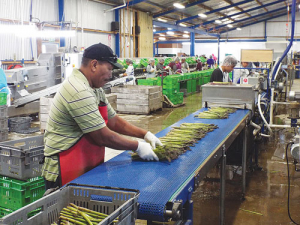Fruit fly discovery puts growers, exporters on edge
Fruit growers and exporters are worried following the discovery of a male Queensland fruit fly in Auckland this week.
 Horticulture NZ says it’s time to take a strategic and measured look at where we grow our food and to protect those regions.
Horticulture NZ says it’s time to take a strategic and measured look at where we grow our food and to protect those regions.
OPINION: Horticulture New Zealand believes it is time to take a strategic and measured look at where we grow our food and protect those regions so that we can feed our future generations with fresh, healthy food.
We cannot take for granted that our fruit and vegetable growers can continue to feed NZ as well as generate increasing export returns.
As the organisation representing growers, HortNZ is talking to the Government about a food security policy. This would ensure access to appropriate growing land and adequate water to keep plants alive and growing. Land most suitable for horticulture is being squeezed by the need for more housing for a growing population, and all the infrastructure that goes with that.
NZ is also looking at how we might manage climate change. We need to get the balance right between climate change mitigation and the need to produce healthy food.
One of the weather patterns we are experiencing is concentrated rain followed by longer dry periods. This places pressure on water supply during dryer periods and causes problems from water over-supply during wet periods. Both rural and urban NZ are affected by these weather patterns. The environmental effects go from flooding at one extreme to very low river flows at the other.
If these patterns continue, methods and locations for growing fruit and vegetables may need to change, and it will become vital for us to store water to prevent excess flows during heavy rain and to provide water during dry periods. This water will be needed for people and animals and for crop survival so that we can feed ourselves.
In terms of food security, it will not be possible to permit undirected urban and lifestyle expansion into areas where sustainable food growing is possible. As a country, we will need to protect the current growing areas and to identify new areas; and there must be a spread of growing around NZ to ensure that during bad weather in one region, other regions can supply the required food.
To bring some evidence to the discussion, HortNZ commissioned Deloitte to look at Auckland’s food bowl – the Pukekohe hub – and report on its economic contribution to Auckland and the wider country, as well as its role in feeding NZers. The report – New Zealand’s food story: The Pukekohe hub – can be found on the HortNZ website.
Although this report is focused on the Pukekohe hub, it is a proxy for many other NZ towns and cities. The report gives facts, figures, analysis and modelling to use in submissions to central and local government.
Just one fact explains how important the Pukekohe hub is as a growing area for Auckland and all NZ: the Pukekohe hub is 3.8% of NZ’s vegetable and fruit growing area but produces 26% of the value. Pukekohe not only feeds Auckland, but at certain times during the year feeds NZ; this is because it is too cold, or perhaps too wet further south to grow some vegetables year-long.
We need growing to be spread around the country so that our domestic vegetable supply can be year-round. We also need to keep all the existing fruit and vegetable growing regions around NZ, and plan how we can keep feeding NZers into the future.
We are not asking for the earth, just enough earth to feed you.
• Mike Chapman is chief executive Horticulture New Zealand
Fonterra’s impending exit from the Australian dairy industry is a major event but the story doesn’t change too much for farmers.
Expect greater collaboration between Massey University’s school of Agriculture and Environment and Ireland’s leading agriculture university, the University College of Dublin (UCD), in the future.
A partnership between Torere Macadamias Ltd and the Riddet Institute aims to unlock value from macadamia nuts while growing the next generation of Māori agribusiness researchers.
A new partnership between Dairy Women’s Network (DWN) and NZAgbiz aims to make evidence-based calf rearing practices accessible to all farm teams.
Despite some trying circumstances recently, the cherry season looks set to emerge on top of things.
Changed logos on shirts otherwise it will be business as usual when Fonterra’s consumer and related businesses are expected to change hands next month.

OPINION: Here w go: the election date is set for November 7 and the politicians are out of the gate…
OPINION: ECan data was released a few days ago showing Canterbury farmers have made “giant strides on environmental performance”.